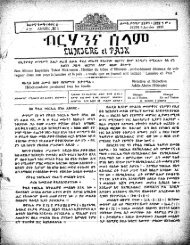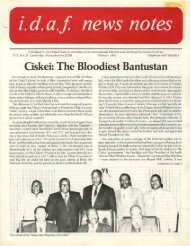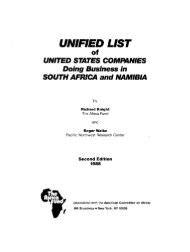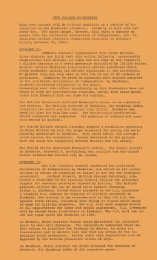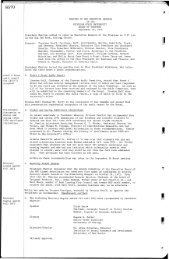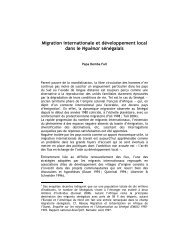FINAL PAPER Ron Wilkins PUB 500/506 15 December ... - KORA
FINAL PAPER Ron Wilkins PUB 500/506 15 December ... - KORA
FINAL PAPER Ron Wilkins PUB 500/506 15 December ... - KORA
You also want an ePaper? Increase the reach of your titles
YUMPU automatically turns print PDFs into web optimized ePapers that Google loves.
<strong>FINAL</strong> <strong>PAPER</strong><br />
<strong>Ron</strong> <strong>Wilkins</strong><br />
<strong>PUB</strong> <strong>500</strong>/<strong>506</strong><br />
<strong>15</strong> <strong>December</strong> 1987<br />
This paper presents an analysis of Unity In Action's decision and action<br />
process, focusing on the refinement of these methods and behaviors over time.<br />
Examined are four key areas utilizing initiation, estimation, selection, and<br />
implementation.<br />
Ideological Principles<br />
The name Unity In Action is itself an ideological principle. This factor,<br />
it seems, is seldom apparent to those who have become aware of the organization<br />
for the first time. After resisting pressures to establish false unity with<br />
barely-active. incorrect, or otherwise rival groups, the ANC of South Africa<br />
proclaimed 1982 to be the "Year of Unity In Action". The ANC declared that<br />
the only way to achieve meaningful unity was to have unity in action on the<br />
battlef"ield. Echoing this theme, Elombe Brath, who later founded Unity In<br />
Action Network in New York, observed, "We (vanguard anti-apartheid activists in<br />
the U.S.) understood that if you wanted to have unity, it could only be in ac<br />
tion ••. and that's what we hold to."l Consequently, the name Unity In Action has<br />
implied a joining together to carry out a serious program of work toward the eli<br />
mination of apartheid. Therefore, a condition of membership within UIA has re<br />
quired of a person or organization a minimal commitment to a) unify with others<br />
and b) engage in a serious program or work designed to eradicate apartheid.<br />
Layered over this key founding axiom were important other ideological prin<br />
ciples of unity. These were decision by consensus, no domination by a single<br />
group or ideology, the African continent as the primary focus, non-sectarianism,<br />
and the right of member organizations to operate independent of the coalition.<br />
Unity In Action's development/adoption in October, 1982, of ideological/<br />
founding principles has been central to the initiation phase. Experience had<br />
taught that without prior adoption of criteria for membership, prioritization of<br />
objectives, democratic decision making, and resolution of internal conflicts,<br />
our failure as a coalition was assured. Unity In Action's initial ideological<br />
principles significantly impacted upon the process of estimation, selection, and<br />
implementation as well. Accordingly, UIA's program design, its ongoing politic<br />
al feasibility analyses, and its "carrying out a program of actions,,2, respec<br />
tively, attest to full utilization of the three phases subsequent to initiation,<br />
as elaborated upon later.<br />
1<br />
- Elombe Brath. "Continent to Continent", 21 October 1987, KPFK/FM, Los Angeles.
Organizing<br />
In considering organizing relative to Unity In Action's decisions and<br />
work, there is an attempt in this paper to internalize/reflect the comprehen<br />
sive appreciation of decisions" addressed in the text. 4 Contextual mapping,<br />
which reflects the estimation phase. dovetails in the next paragraph with the<br />
effort to keep in focus "relationships". "interactions", and "multiples" vis a<br />
vis the framework and procedures of policy estimation.<br />
The present multiple perspectives on how Unity In Action is to achieve its<br />
goal of inducing artist compliance with the Cultural Boycott or resolving the<br />
problem of cultural collaboration with apartheid South Africa includes the fol<br />
lowing: embarassing offenders by staging visible. loud, and angry protests at<br />
their concerts; threatening offenders with such protests; persuading them with<br />
rational arguments; enlisting support form fellow artists to help persuade of<br />
fenders; and educating errant artists. The multiple perspectives of the past<br />
on this question differ from present ones in that. while present persepctives<br />
were also operative during preceding years. the staging of protests was the<br />
dominant tactic. Future multiple perspectives on how UIA is to achieve its goal<br />
include all of the above with the noteworthy addition of the proposed utiliza<br />
tion of a three-month moratorium on picketting and an amnesty period for offend-<br />
ers.<br />
Present multiple (organizing) goals for UIA are the prevention of artistic<br />
collaboration with the apartheid state, institutional and municipal disinvest<br />
ment, and material and political support to anti-occupation/colonial forces in<br />
Namibia. Past multiple goals have included the above. as well as material aid<br />
to the People's Revolutionary Government of Grenada. Future multiple goals.<br />
with the exception of assistance to Grenada, will include a renewed effort to<br />
close the South African consulate in Beverly HIlls. As with ongoing previous<br />
efforts. once consideration of renewing such an effort withstands the test of<br />
political feasibility (selection). successful organizing will be the key to its<br />
effective implementation.<br />
Unity InAction has striven, more in the recent rather than the earlier per<br />
iod. to make each activity that it sponsors an opportunity also to build the or<br />
ganization. The community it seeks to organize most is L.A.'s Black working<br />
class. which includes a cross section of blue collar and professional workers.<br />
students, and the unemployed. Organizing against apartheid has often been ac<br />
complished, in a massive or less-direct way, depending on the politics of<br />
4 Brewer and DeLeon. "The Foundations of Policy Analysis". p. 227.<br />
3



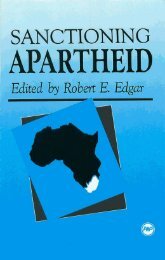
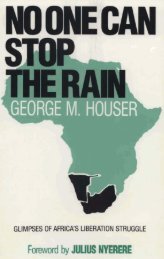
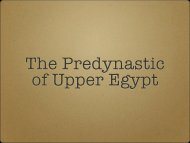
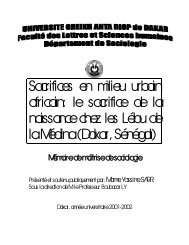
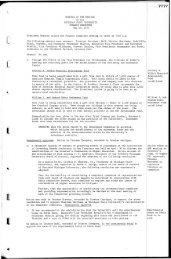
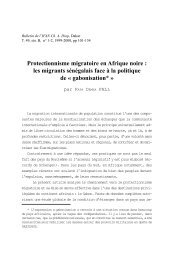

![Synthèse [6] DEFALL..INSTRAW.pdf - Matrix](https://img.yumpu.com/17880734/1/190x245/synthese-6-defallinstrawpdf-matrix.jpg?quality=85)
